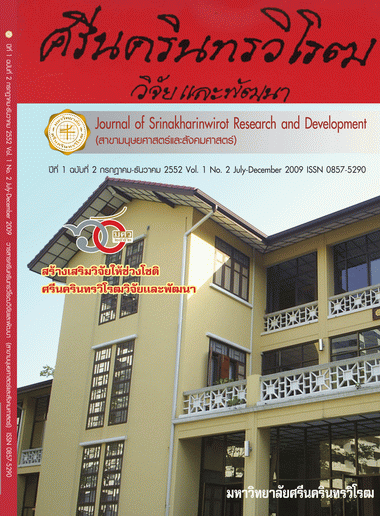การใช้กิจกรรมประกอบจังหวะเพื่อพัฒนาความรู้ด้านคำศัพท์และความคงทนในการเรียนรู้คำศัพท์ภาษาอังกฤษของนักเรียนชั้นประถมศึกษาปีที่ 4 (THE USE OF RHYTHMIC ACTIVITIES TO DEVELOP ENGLISH VOCABULARY LEARNING AND RETENTION OF PRATOMSUKSA 4 STUDENTS)
Keywords:
Rhythmic activities, Vocabulary learning, Vocabulary retention, EnglishAbstract
บทคัดย่อการวิจัยครั้งนี้มีจุดมุ่งหมายเพื่อศึกษาผลของการใช้กิจกรรมประกอบจังหวะที่มีต่อความรู้ด้านคำศัพท์ ความคงทนในการเรียนรู้คำศัพท์ และศึกษาความพึงพอใจในการเรียนภาษาอังกฤษโดยใช้กิจกรรมประกอบจังหวะของนักเรียนชั้นประถมศึกษาปีที่ 4 กลุ่มตัวอย่างที่ใช้ในการวิจัยครั้งนี้ คือ นักเรียนชั้นประถมศึกษาปีที่ 4
โรงเรียนวัดปากบ่อ กรุงเทพมหานคร ภาคเรียนที่ 1 ปีการศึกษา 2551 จำนวน 1 ห้องเรียน 40 คน ซึ่งได้มาจากการสุ่มอย่างง่าย (Simple Random Sampling) ดำเนินการทดลอง 12 สัปดาห์ สัปดาห์ละ 2 คาบ คาบละ 50 นาที รวม 24 คาบ ไม่นับรวมคาบที่ใช้ในการทดสอบ เครื่องมือที่ใช้ในการวิจัย คือ แผนการสอนโดยใช้กิจกรรมประกอบจังหวะเป็นกิจกรรมหลักในบทเรียน จำนวน 12 แผน แบบทดสอบวัดความสามารถในด้านความรู้คำศัพท์และความคงทนในการเรียนรู้ แบบสัมภาษณ์ และแบบสอบถามความพึงพอใจในการเรียนภาษาอังกฤษ สถิติที่ใช้ในการวิเคราะห์ข้อมูล คือ ค่าเฉลี่ย (Mean) ค่าความเบี่ยงเบนมาตรฐาน (Standard Deviation) และ t-test for Dependent Samples
ผลการศึกษาพบว่า (1) การใช้กิจกรรมประกอบจังหวะ ทำให้นักเรียนมีคะแนนเฉลี่ยจากแบบทดสอบหลังการทดลอง สูงกว่าก่อนการทดลองอย่างมีนัยสำคัญทางสถิติที่ระดับ 0.05 (2) มีคะแนนความคงทนในการเรียนรู้คำศัพท์ภาษาอังกฤษหลังจบการทดลองเมื่อเวลาสิ้นสุดแล้วเป็นเวลา 2 สัปดาห์ กับ 4 สัปดาห์ไม่แตกต่างกันอย่างมีนัยสำคัญทางสถิติที่ระดับ 0.05 (3) นักเรียนที่เรียนโดยใช้กิจกรรมประกอบจังหวะ มีความพึงพอใจในการเรียนภาษาอังกฤษสูงขึ้นกว่าก่อนการทดลอง
Abstract
The purpose of this research was to study the effect of using rhythmic activities on vocabulary learning and retention of Pratomsuksa 4 students. The sample group was Pratomsuksa 4 students in their first semester of the academic year 2008 at Wat Pakbor School, Bangkok. They were selected via the simple random sampling technique. The research was carried out for twelve weeks two periods a week. The research took for twenty-four class periods, fifty minutes each, excluding the test periods. The instruments used in this research were twelve lesson plans, a test on learning achievement and on retention of vocabulary, a questionnaire about the student’s satisfaction on learning vocabulary with rhythmic activities, and an interview record form. The data were statistically analyzed by mean, standard deviation and t-test for Dependent Samples.
The findings were as follows: (1) The students taught by rhythmic vocabulary activities gained higher posttest mean scores than the pretest mean scores with statistical significance at the level of 0.05. (2) The student’s vocabulary retention mean scores after the 2 weeks and 4 weeks experiment were not significantly different at the 0.05 level (3) The students had higher satisfaction on learning English after being taught by rhythmic vocabulary activities.
Downloads
Downloads
Published
How to Cite
Issue
Section
License
Srinakharinwirot Research and Development Journal of Humanities and Social Sciences is licensed Under a Creative Commons Attribution-NonCommercial-NoDerivs 4.0 International (CC-BY-NC-ND 4.0) License, Unless Otherwise Stated. Please Read Journal Policies Page for More Information on Open Access, Copyright and Permissions.



